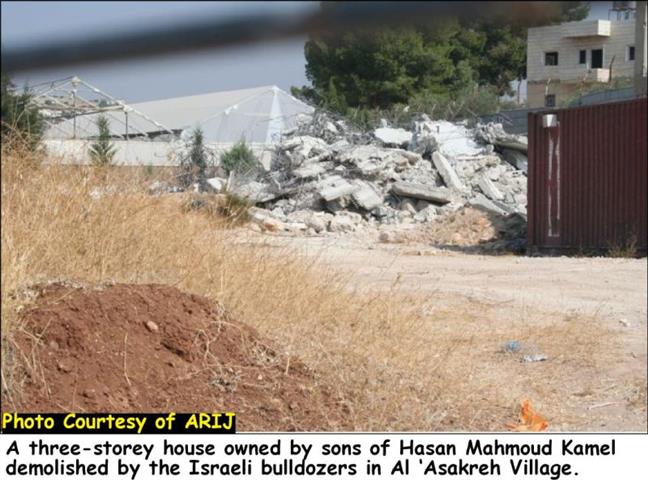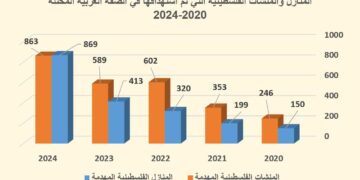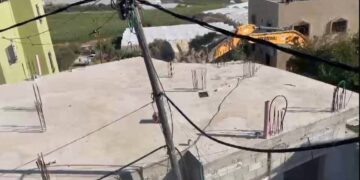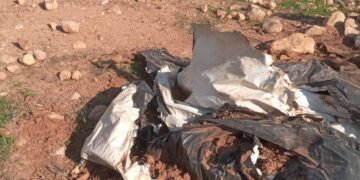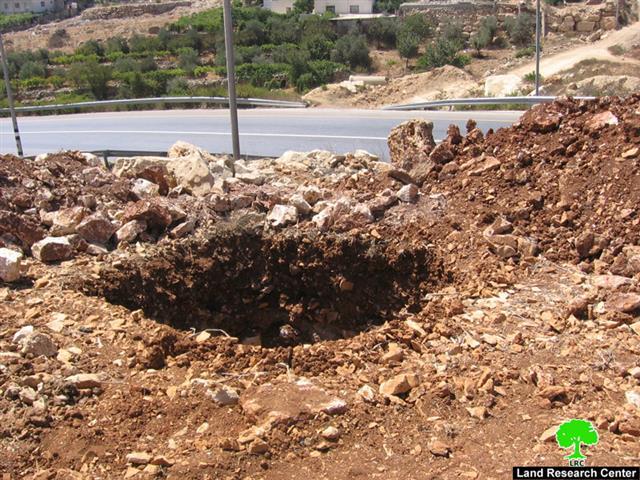On June 19, 2007, the Israeli bulldozers accompanied by armed Israeli vehicles stormed the village of Al ‘Asakreh, southeast of Bethlehem city and demolished a three–storey home (610 m2), a well, and silos (70 m2) without any pre-notification. The pretext for the demolition is 'building without licenses' since the structures in question are located in Area 'C', which, falls under the control of the Israel civil administration.
In an interview with ARIJ field worker on August 15, 2007, the head of Janata village council, Mr. Kamel Shwareya, indicated that the demolished structures were owned by sons of Hassan Mahmud Kamel, and they did not receive any Israeli notification or military order of demolition. See Photo 1 & Photo 2
Mr. Shwareya went on to say that the latest demolition was the first of its kind in the area and the incident left 10 people homeless. He added that the owners are afraid that the Israeli bulldozers will also demolish the other four plastic houses (the main source of income for the family) located in the same area because they have no chance of getting a building permit even though the land has belonged to their families for generations. See Photo 3
The demolished area is located some 200 meters away from the Za'tara bypass road which connects the south-eastern settlements of the Bethlehem governorate with those in Jerusalem. A detailed study about this bypass road and its impact on surrounding Palestinian communities was posted on the ARIJ website: More Land Confiscated to build By-Pass Road in Za'tara
Ten years ago, there was an Israeli plan to establish a bypass road on lands belonging to the villages of Al ‘Asakreh, Harmala, Beit Falouh, Khallet Al Louza, Khirbet An Nahla, Abu Nujeim, and Khallet Al Qaranin in the Bethlehem governorate. According to the analysis conducted by the Geo-Informatics unit at ARIJ, the planned bypass road will extend a total length of 5.9 km, passing through the area of the demolished houses and threatened in Al’Asakreh and the neighboring Palestinian localities. What is taking place on the ground clearly tells that the Israeli plan is still viable. In addition, if any of the Israeli government to come decides to construct the bypass road, the administrative procedures would be completed and then the bypass road will separate almost 20 Palestinian communities in the south (housing more than 30,000 inhabitants) from the rest of Bethlehem Governorate, and will results in hampering of the economic, political, educational, medical, and social service activities necessary for a healthy society. [See Map 1]
Two other Palestinian structures (a silo and a plastic house) property of 'Ali and Kamel Al Zeer are threatened to be demolished in Harmala village, under the pretext of being unlicensed. Click here to read full report.
Generally, the Israeli Army do not send warnings in advance of any procedure it takes, house demolition, uprooting trees, etc. Palestinians may only have a little time (at most half an hour) to take out whatever belongings they have, before the Israeli Army’s soldiers go into the house and starts to throw out the furniture into the street and their homes are bulldozed.
Al ‘Asakreh village: Location & Population
The village of Al 'Asakreh is located about 4.5 km to the southeast of Bethlehem and some 10 km east of the 1949 Armistice Line (the Green Line). It has an area of 2,116 dunums of land and a population of 1,001 inhabitants (PCBS, 2006), most of whom work in the agriculture sector. It is part of 'Arab El Ta'amreh village cluster which occupies a total land area of 217,636 dunums and includes the villages of Umm 'Asla, Khirbet ad Deir, Khallet al Haddad, Khallet al Qaranin, Ash Shawawra, Za'tara, Beit Ta'mir, Tequ', Al Manshiya, Al Khushna, Jubbet Adh Dhib, Al Fureidis, Al 'Asakreh, Al 'Iqab, Harmala, Beit Falouh, and Al Halqum.
Conclusion
The Israeli Army adopts a strict policy to control the expansion of the Palestinian built-up area in locations that fall under their jurisdiction (Area 'C'). In fact they aim to depopulate all Palestinian rural areas or at least keep it with minimal number of Palestinians after as the assume control over the vast land areas there. The policy of house demolition is a grave violation of human rights against the Palestinian residents in the West Bank and should be ended immediately. By targeting Palestinian houses for house demolitions and rejection of building licenses, the Israeli government has violated its obligations under international human rights and humanitarian law which it has promised to uphold.
Related Case Studies:-
-
Israeli Settlers Set Fire to Palestinian Agricultural Lands in the Village of Tuqu' in the Bethlehem Governorate. August 9, 2007.
-
Janata Assembly Loses More Land to Military Expansion. March 22, 2006.
Prepared by
The Applied Research Institute – Jerusalem (ARIJ)


